Who was Edward Colston and why is Bristol divided by his legacy?
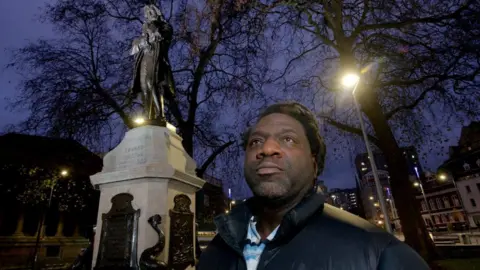 Dave Betts
Dave BettsThis article was first published in February 2018
Bristol's fame and wealth were built on the slave trade and few slave traders were more infamous or wealthy than Edward Colston. Almost 300 years since his death, his past is set to be formally acknowledged by the city for the first time. But does this go far enough?
Colston made his fortune through human suffering. Between 1672 and 1689, ships are believed to have transported about 80,000 men, women and children from Africa to the Americas.
However, in the city he called home, his memory has been honoured for centuries. On his death in 1721, he bequeathed his wealth to charities and his legacy can still be seen on Bristol's streets, memorials and buildings.
His statue, which stands on Colston Avenue in the city centre, makes no mention of his notorious past. But this could be about to change.
The city council is proposing to put a plaque on the statue which will recognise and acknowledge the people Colston and others in the city enslaved.
It's a move that has been a long time coming, says Ros Martin, one of the driving forces behind the Countering Colston campaign group.
"The plaque is good but we need it to be part of an ongoing examination of historical narrative and a change of attitudes and culture.
"What we want goes beyond tokenism - we want institutions and organisations in the city to examine their history and acknowledge their individual roles in the slave trade and beyond."
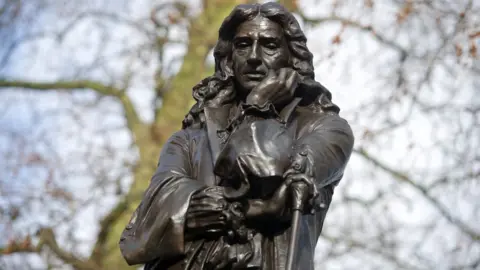 Dave Betts
Dave BettsThe drive to reconsider Bristol's attitude to Colston has long been gathering momentum.
For years Massive Attack refused to play at hometown venue Colston Hall, which last year agreed to drop the slave trader's name.
Not before time, says Miles Chambers, the city's poet laureate.
"Some people don't get that black people still feel the full impact of slavery today.
"We can look at the descendants of the slaves and economically they are still worse off; psychologically they are still worse off; mentally they still feel collectively as inferior; more African-Caribbean males are disproportionately in prison and in the judicial system; they do worse at schools; economically are paid less and are working less.
"The pattern continues and even though many people say slavery is over, because of those legacies we still feel enslaved.
"A name change or statue move is not going to rectify racism or eradicate the slave mentality that still exists, but it will help to say to black people: 'You are equal to us, you are British, you are valuable and you mean as much to us as any other citizen.'"
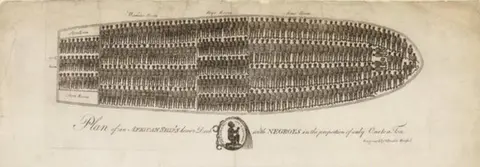 Bristol Museums, Galleries and Archives
Bristol Museums, Galleries and ArchivesIn 1680 Colston became a member of the Royal African Company which at the time had a monopoly on the slave trade. By 1689 he had risen to become its deputy governor.
Slaves bought in West Africa were branded with the company initials RAC, then herded on to ships and plunged into a nightmarish voyage.
Closely shackled together, hundreds of enslaved people lay in their own filth; disease, suicide and murder claimed between 10 and 20 per cent of them during the six to eight week voyage to the Americas.
Human suffering on this scale made Colston rich and a grateful Bristol honoured his benevolence; naming dozens of buildings, institutions, charities, schools, sports clubs, pubs, societies and roads after him.
His charity is commemorated during processions and church services. School children have paid homage to him at services. His statue stands in the city centre, inscribed as a "memorial of one of the most virtuous and wise sons of the city".
For hundreds of years, he has been unquestionably venerated.
"Colston may have helped more people than he abused but the people he abused and their descendants say this is unacceptable and although they are a minority, something needs to be done about it," says Mr Chambers.
"We are still seeing the effects of slavery in this city, there is still money from slavery in this city and so we can't ignore it."
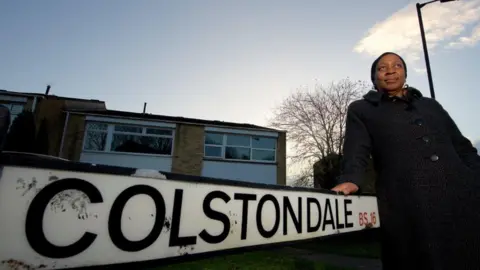 Dave Betts
Dave BettsThere have been questions about Colston and his profile in Bristol since the 1920s but they remained largely ignored until 1999 when Prof Madge Dresser, at the University of West England, spoke about Colston and his involvement in the slave trade.
The next morning, "Slave Trader" was scrawled across his statue.
The graffiti was scrubbed off and the city went back to turning a blind eye until two years ago, when Countering Colston ignited the debate once again.
It has staged protests outside many events linked to Colston and called for the city to remember, among other things, the "full, true history of transatlantic slavery, colonialism and exploitation".
"When you come to Bristol you go around the streets and, for anyone outside coming in, they must think 'Who is this man?' and 'Why are so many buildings, roads and schools named after him?'," says Ms Martin.
"I think it's very disingenuous, very disrespecting of the memory of African ancestors who contributed to the wealth of the city through enslaved labour. They suffered and there is not enough recognition in any way.
"[Countering Colston] would like to see permanent public art works as a memorial to the victims of the city's human trafficking into enslavement.
"I would like all those institutions that played a role in this business of transatlantic inhumanity to provide public exhibitions of their involvement and a monument to those who suffered in their institution."
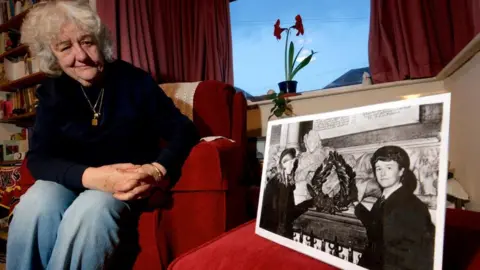 Dave Betts
Dave BettsCountering Colston's work is beginning to make its mark.
After Colston Hall announced it was severing any connection with the slave trader, others swiftly followed.
For the first time in centuries, a controversial church service in his name was dropped last year; the custodians of St Stephen's citing a "growing concern" about a man who made his money from buying and selling people.
However, for some the campaign is simply going too far.
"We all knew what he'd done but it wasn't spoken about," says Jane Ghosh, a former head girl of Colston Girls school. Founded in 1891 with an endowment left in his will, the school has steadfastly refused to drop his name.
During her school days, Ms Ghosh took part in many Charter Day ceremonies to commemorate the school's founder. As head girl, she joined the procession through the city to placed a wreath on his tomb, while Colston buns - created by and named after the merchant - were handed out during the service.
"I'm not an apologist [for slavery] but I am a realist," she continues.
"So many families, so many buildings in Bristol are connected to the slave trade and one of the reasons I get a bit cross is because I think, 'Why are we picking on Colston?'
"So many people were a mixture of good and bad - as we all are - and he seems to be singled out and I don't know why."
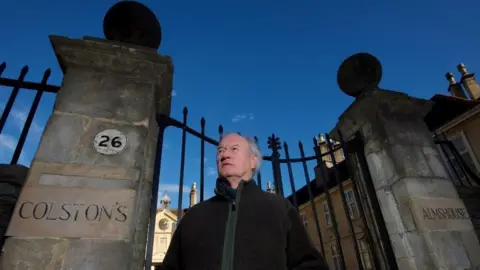 Dave Betts
Dave BettsBetween 1698 and 1807 just over 2,100 Bristol ships set sail on slaving voyages with many of the earliest voyages funded by ordinary people who provided cash or goods to be bartered for captured slaves.
That Colston's name has not disappeared with time is testament to his membership of an influential and selective group of Bristol businessmen.
The Society of Merchant Venturers helped set up and run many of the institutions and charities that still bear his name.
Former museum curator and society member Francis Greenacre says the achievements of a man who did so much for charity have now been overshadowed by the debate about his name.
"His status was extraordinary... the extent of his charity was vast in Bristol and enormous in London, as it was throughout the country."
His wealth also founded schools and almshouses for the poor and he entrusted the society to carry on his work.
Today, the Merchant Venturers run nine schools in Bristol, are involved in social enterprise, charities looking after the elderly, scholarships and trusts.
However, controversial ceremonies are still reported to exist including a Silent Toast to Colston during the Grateful Society's annual dinner.
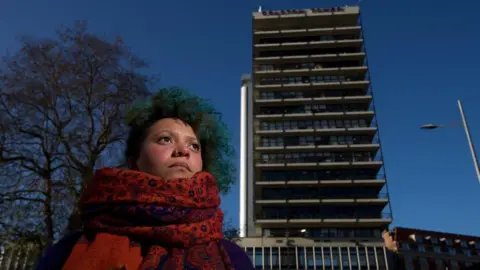 Dave Betts
Dave BettsCampaigners accuse the society of continuing to "celebrate a slave trader". Mr Greenacre says the society is commemorating Colston's charity work, rather than his slaving past.
"That word [celebrate] comes from Countering Colston - it is in no sense what is being done," he says.
"We are not celebrating the slave trade; that is a perception which is in effect deeply offensive."
However, he acknowledges that times have changed and society must change as well, referring to the council's decision to acknowledge Colston's past.
"Someone walking past his statue, which makes no reference to the slave trade; if they are a descendant of enslaved Africans they may feel genuinely offended; indeed some feel not just hurt but real anguish and that ought to be addressed."
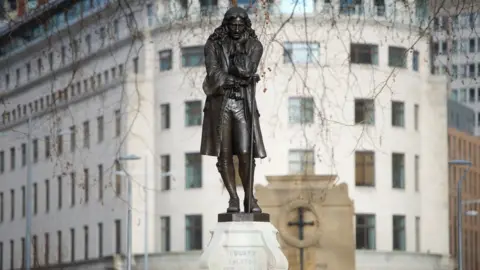 Dave Betts
Dave BettsFor some, the amendment to Colston's statue is not enough.
"I would really like it if the statue was put in the museum," says Jasmine Ketibuah-Foley, a presenter for community station Ujima Radio, which focuses on Bristol's African-Caribbean population.
"People can still see that this is a man who did a lot for Bristol, but we should put [a statue] in the city centre of a black Bristolian who has changed Bristol and done something good for Bristol."
Others think saving Colston's legacy is not even as simple as moving a statue or changing the name of buildings, roads and schools.
When he heard the concert venue would be dropping the name, history graduate Max Barton set up a petition against the move which attracted 5,000 signatures.
He said it was "time to educate and not eliminate" people about the slave trader and his history.
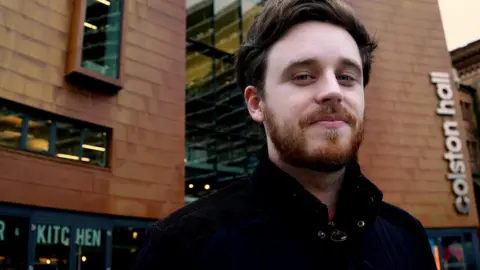
"White, working-class Bristolians have grown up with Colston as a kind of father of Bristol," he says.
"They see him as a figurehead, they see him as this person who was a great charitable philanthropist - wiping out that history would alienate this group.
"Countering Colston has a list of places associated with Colston on their website - a hit list as far as I'm concerned... they want to eliminate him from history and that will alienate people."
Bristol is not alone in trying to come to terms with its past. From Oxford to Charlottesville, from Sydney to Cape Town, cities are facing the same question - how do you remember history without celebrating brutality?
Historian Dr Edson Burton is reluctant to see Colston's name disappear but believes Bristol is similar to many cities in being "built on a romanticised myth".
He says now we are in a position to question "the great figures that we have venerated in the past", we should not be surprised to "find that they are not up to the mark for our modern standards".
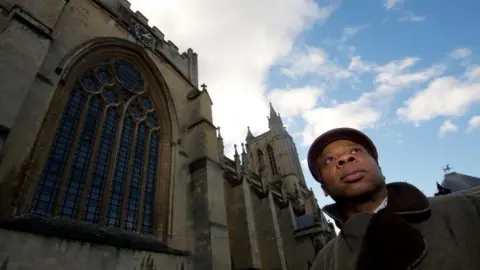 Dave Betts
Dave Betts"I see that there are a number of institutions willing to look their history in the eye and acknowledge that there is a question about the legacy and foundation on which they were built.
"I think that is a monumental step - my concern is that it is not sufficient enough."
He is one of many in the city searching for a solution.
At the vanguard of change, in more ways than one, is Colston Primary School, which announced last year it would be changing its name.
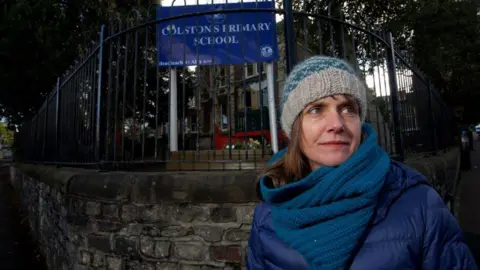 Dave Betts
Dave BettsChair of governors Kate Swainson Price said the decision was not about pandering to political correctness.
"For me, the decision to change our school name is about a recontextualisation of history rather than eradication, obliteration or whitewashing.
"It's making history, not erasing history. Facts don't change but attitudes and values do, as do societies."
The school is now at the centre of plans to design the new plaque on Colston's statue, which will recognise and acknowledge the people he and others in the city enslaved.
The children will be joining Countering Colston members, Prof Dresser and the city council to help put Colston's legacy into context.
Ms Swainson Price said it was "amazing and appropriate" for the children to "to help review and redress the balance about how we remember and acknowledge Bristol's historical figures" and "importantly, the slaves themselves".
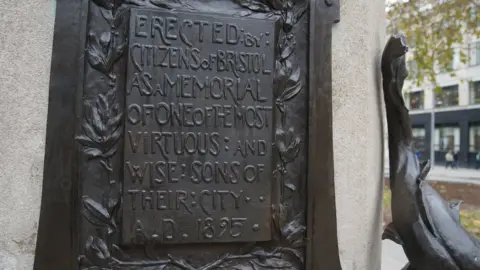
The man in charge of the project, the council's historic environment officer Pete Insole, said the people who were exploited by Colston are "invisible" in Bristol.
He is helping to co-ordinate events during the summer about the city's links to the slave trade, which will culminate in the unveiling of the plaque.
"Slave traders are the most commemorated people in the city; we can't change the past but we can change the present and the future," he added.
But for Ms Martin this is only the beginning: "We have created debate... It's not just Bristol, it's a global narrative, it's about colonisation and decolonisation.
"Across Europe and across America the debate is very alive. We are questioning people and we are challenging society.
"You are only here for a short time on Earth and I like to think we are bequeathing something better than we have inherited."
 Bristol Museums, Galleries and Archives
Bristol Museums, Galleries and Archives